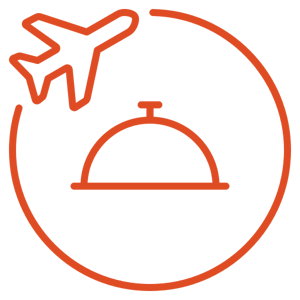When visiting Colombia, one of the questions many have is what to eat in Colombia.
In this article, we cover what we believe are typical Colombian dishes you must not miss during your travel.
Before jumping to the results, we briefly summarize what Colombian gastronomy is all about.
You can navigate through this extensive article by clicking on each green link if you’d like to save time, or simply keep reading.
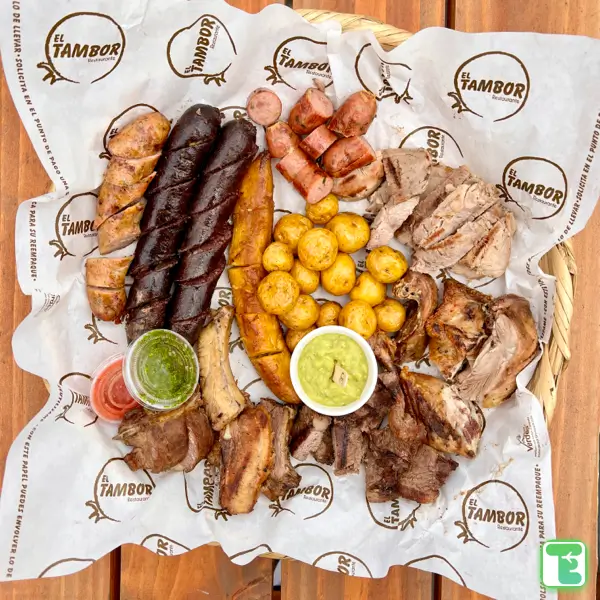
First of all, Colombian cuisine can basically be divided into four important food categories, with each region with its own specialties.
The categories are (1) arepas, (2) empanadas, (3) soups, and (4) one-pot meals.
This is a simplification but helps us add a bit of structure to this article.
To make it even simpler for ourselves, we added a few more categories as well.
Once you start traveling through this amazing country, you start noticing that these typical Colombian food categories pop up everywhere you go.
The six (food) regions
The six regions of Colombia are the Caribbean, Pacific, Orinoco, Amazon, Andean and Insular.
At the bottom of this article, we give an overview of what specific food each region is known for.
Not all region-specific dishes are elaborated on in this article, otherwise, we would end up writing a complete book.
We picked the most common Colombian dishes that you will encounter during your travel and that are also available in many places.
This will most definitely help you answer your question about what to eat in Colombia.
Also, it’s good to know that Colombian food is not spicy, although there are a few tricks to spice things up, which we explain later in this article.
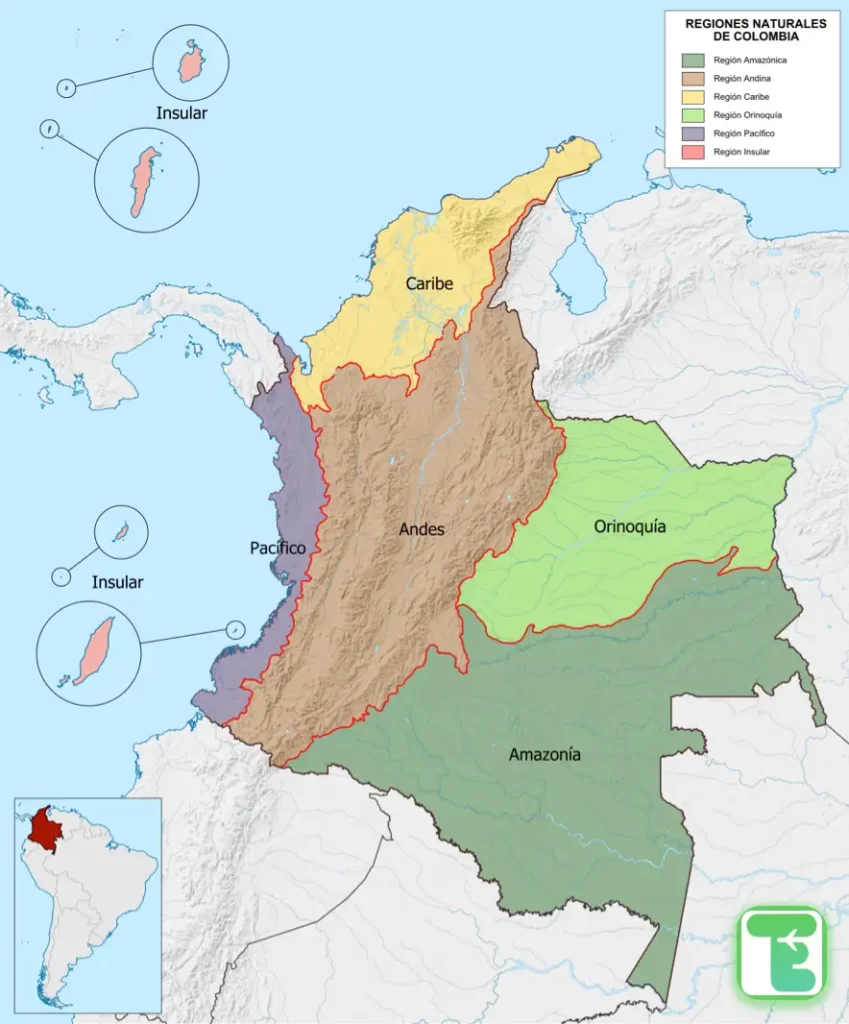
Food in restaurants vs. home-cooked meals
Secondly, in my personal experience, there is a huge difference between what to eat in Colombian restaurants and what to eat at home.
The food that’s served at typical Colombian restaurants is often somewhat heavy, meaning lots of meat, large (deep-fried) portions, and no vegetables at all.
While eating at (someone’s) home, the typical Colombian food is much healthier with plenty of veggies, decent portions, and everything cooked from scratch.
You will notice that food in certain regional restaurants often seems heavy, but there are some lighter alternatives that we discuss in this article.
If you have a better understanding of the different cuisines within Colombia, you can balance it and enjoy local food during your travels without getting bloated or getting sick.
Second most biodiverse country in the world
Lastly, the most important factor in the diversity of Colombian gastronomy is the fact that Colombia is the second most biodiverse country in the world, meaning that there is an abundance of (regional) fruits, vegetables and other ingredients.
That’s why each region has its own specialities, but also why typical Colombian food has its own regional flavours.
In other words, Colombia is an amazing country when it comes to exploring foods. With that all being said, let’s jump to our answer to what to eat in Colombia.
Colombian food you must try:
1. Arepas
Arepas are perhaps the most important part of Colombian cuisine.
It’s like rice to Asia or potatoes to Europe.
An arepa is a cornflour “bread” that looks a bit like pita bread, although arepas can have different thicknesses and sizes throughout the country.
There is an endless debate about where arepas originally came from (either Colombia or Venezuela).
We don’t dare to join that discussion, but the fact that it’s a discussion in the first place means how important this food is for both Colombians and Venezuelans.
Funny enough, it’s not only eaten in these two countries.
Most countries in the north of South America eat arepas.
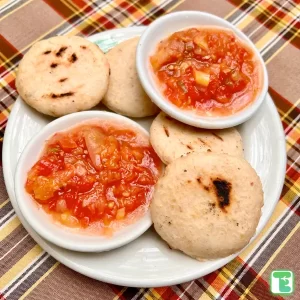
Arepas, one of the most important foods in Colombian Cuisine.
As we told in the introduction, each region gives Colombian food its own twist, based on what typical, local ingredients grow in that region.
Arepas throughout Colombia vary enormously.
For example, the coastal regions deep-fry the arepas into something crunchy (Arepa Huevo – with egg filling), while the Antioquia serve plain arepas, without even salt or sugar.
When travelling through the Colombian regions, make sure to try the local area of certain regions so you find out which type of arepa you enjoy the most.
Arepas can be served in smaller sizes as a side dish, or as a stand-alone dish in the form of a (fast-food) snack.
You eat it at breakfast, accompanied by typical Colombian food and scrambled eggs (Huevos Pericos), or just simply with butter.
Popular arepas are Arepas de Chocolo and Arepas con Queso, but you will find all sorts of arepas during your journey.
At first, I did not know what to think of this typical Colombian dish, but after staying in Colombia for many months, I couldn’t picture my food without arepa(s).
To give you a good idea of what kind of creations there are with arepas, have a look at our article about the best arepas in Medellin.
We guarantee that when you travel through Colombia, you will try – and love – many arepas.

Arepa de Chocolo
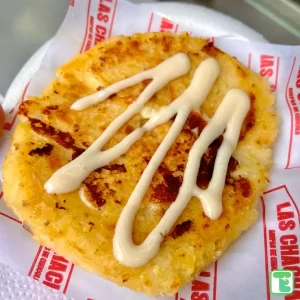
Arepa de Queso
2. Empanadas
Introduced by the Spaniards, empanadas are a well-known dish that can be found throughout South America, so you would not immediately think it is a typical Colombian dish.
However, the popularity of this snack is so immense, that you cannot picture Colombia without empanada vendors on the street.
Also, the fillings of the empanadas vary enormously from empanadas in other countries.
It’s fair to say that the Colombians adopted the empanadas quite well, although added their own flavours to it.
Although empanadas are far from healthy, there are plenty of Colombians who eat this deep-fried snack on a daily basis.
Colombian empanadas are usually made with so-called Juka potatoes or with Harina (a type of cornflour).
The big difference between the Juka and the Harina empanadas is that the Harina empanadas are made in the oven, while the Juka empanadas are deep-fried.
One of the most-used fillings is one with minced beef, but other savoury and even sweet fillings are common too.
Empanadas are often eaten with guacamole or aji, which is a slightly spicy and sour dipping sauce (although the spiciness can vary).
The most famous empanadas can be found in the city of Cali, although each city has its own specialists.
When visiting Medellin, make sure to visit one of the best empanada shops in Medellin that serve outstanding Empanadas.
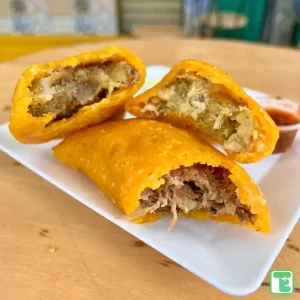
Empanadas with all sorts of fillings.
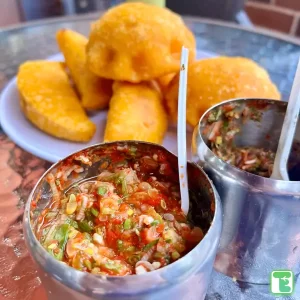
Colombian food is not spicy, but you can spice things up with Aji.
3. Sopas (Soups)
Simply put this way, Colombians love their soups.
It’s almost hard to imagine how important soups are in Colombian cuisine.
The soups are a great addition to the rest of the mostly heavy meals that the country has to offer.
Most regions have their own typical soup.
The most important Colombian soups are listed below, but there are many other soups to discover during your travel.
a. Sancocho
The most important and popular Colombian soup is Sancocho, although other South American countries have a type of Sancocho in their cuisine as well.
The soup is typically made with banana, potato, cassava, tomato, scallion, cilantro and mazorca and served with corn, avocado and rice.
But even in Colombian cuisine, there are many variants to be found.
Again, each region has its own flavouring, but there is also a difference in what kind of meat (or fish) to use.
The Pacific region makes the soup with coconut milk.
The Caribbean region makes Sancocho with fish. In the centre of the country, there is a Sanchocho soup called Trifasico, which has chicken, beef and pork in it.
And in the western parts of the country, a popular version called Sancocho Valluno is filled with slow-cooked chicken, beef ribs, plantains, yuca and potatoes.
Sancocho is eaten everywhere in the country and is a meal typically during lunch.
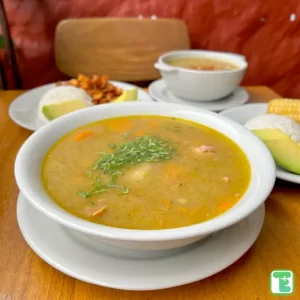
Sancocho is the most popular soup in all of Colombia and is eaten in every region.
b. Aijiacos
Aijicaos is a famous soup from Colombia’s capital, Bogota and was even declared cultural patrimony by the major’s office two decades ago.
The soup is typically made with shredded chicken, three types of potatoes, corn, guasca herbs, cream, avocado and capers.
The capers and cream are served separately, meaning you can adjust them to your own taste.
The three potatoes have each their own purpose, ranging from making the soup creamier and giving it texture to giving it the right colour.
Although you can find Aijiacos in other countries, Bogotánians truly believe their version is the authentic and original one.
Of all the Colombian soups I’ve tried, Aijiacos is my personal favourite!
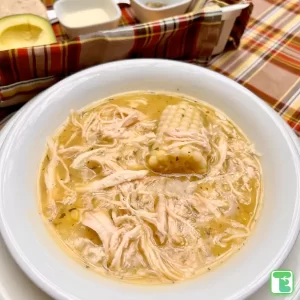
Aijiacos, another famous Colombian soup.
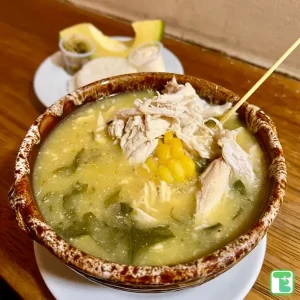
Aijiacos Santafereño
c. Mondogo
Although you can find Mondongo in places like Bogota, you usually eat this typical Colombian soup in Medellin and the Antioquia area.
The soup is a tomato-based dish that contains an important, yet maybe too exotic ingredient, namely beef tripe.
In the past, when people could not afford real meat, they often chose a substitute such as beef tripe, something that is not common for the Western taste palette.
Although it’s not about whether it’s cheaper or not, Mondongo is simply served with beef tripe which not only is adventurous but also can give the soup a certain flavour.
In Colombia, you can find versions of chicken, pork or turkey tripe as well.
One of the most famous local restaurants in the country is Mondongo’s, which has two restaurants in Medellin.
In our article about the best Mondongo in Medellin, you can find some other impressive restaurants too.
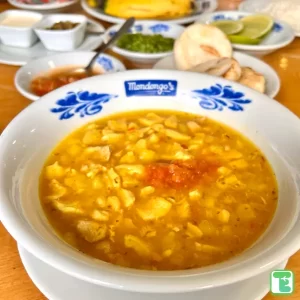
Mondongo with plenty of beef stripe.
d. Mute
Mute is a typical soup from Santander, which is a hearty, thick soup made with chickpeas, corn, beef shank, potatoes and even pasta.
The soup is almost like a stew.
As you can imagine, this soup is filling and one bowl of this tasty soup will keep your stomach filled for the next few hours.
Besides, the soup is served with rice and avocado, and occasionally an arepa as well.
It is difficult to find Mute outside Santander, Cundinamarca and Boyacá, so make sure to have a taste of the delicious soup when visiting these parts of Colombia.
e. Caldo de Costilla
This typical Colombian soup is mainly eaten during breakfast.
It’s a pretty straightforward soup made from beef broth together with potatoes, garlic, onion and cilantro.
It originated from the Andean region and is commonly known as the cure for hangovers, although we’ve never had any success.
But here is the fun part: there are bars and clubs that are open until the early morning that serve this typical soup to their customers in the hope they will feel better and stay longer.
Apart from this anecdote, the soup is definitely tasty and you should give it a try as breakfast together with an arepa.
f. Sopa de Arroz
Sopa de Arroz is a rice soup and is a popular Colombian soup that will fill your stomach quite easily.
The savoury soup got its flavour mostly from the chicken stock, although the added vegetables and cilantro finish the soup nicely.
The soup is usually served with chicken thighs or drumsticks, but we encountered one that even had a fried chicken wing on top of it.
This is a kind of soup that can’t go wrong flavour-wise, an all-time favourite to many!
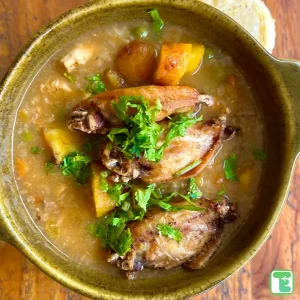
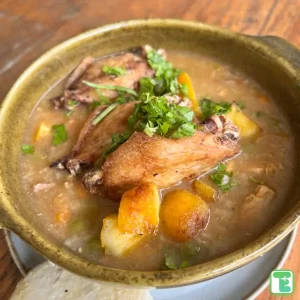
Sopa de Arroz
g. Sopa de Lentejas
Beans and lentils play an important role in the Colombian cuisine.
Not only are they both enormously nutritious, but they are also tasty too.
This savoury soup is made with lentils.
The trick that makes it so delicious is the use of salty sausages in it.
It’s almost a meal in a bowl.
Although it’s common to use Chorizo, variations with Salchichon and Salchicha sausage are mouthwatering too.
Like many Colombian dishes, one bowl of this rich soup keeps you going all day and it’s commonly eaten during lunch time.
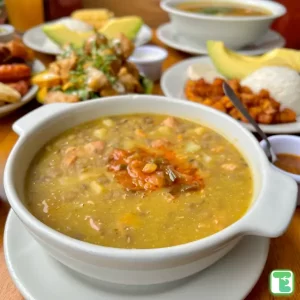
Sopa de Lentejas
4. Cazuela
The fourth food category we described in the introduction is the one-pot dishes.
One of these typical one-pot dishes is Cazuela (cooking pot), which is a common dish in South America.
Within the Colombian cuisine, there are several enormously popular Cazuelas that you have to try out yourself.
a. Cazuela de Mariscos
One of my favourite coastal dishes is Cazuela de Mariscos, which is a creamy seafood casserole (stew) from the Caribbean region.
This rich soup is served with patacones and coconut rice, which is typical coastal rice.
Occasionally, the stew is gratinated with cheese, which can make the stew heavy.
Cazuela de Mariscos has flavours most foreigners love and therefore is one of the more popular Colombian seafood dishes in general.
You can find all sorts of seafood variations along the coast, for example with langoustines and squid.
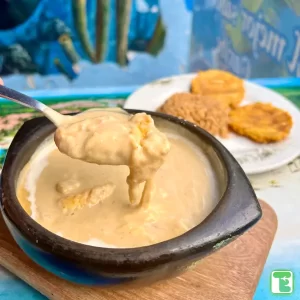
Cazuela de Mariscos with cheese (and coconut rice + patacones).
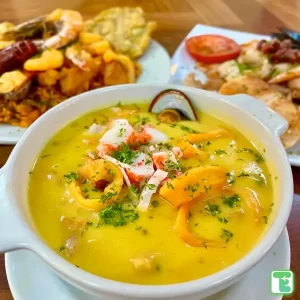
Cazuela de Mariscos without cheese.
b. Cazuela de Frijoles
This one-pot dish has many similarities with Bandeja Paisa, a dish we describe in the next paragraph.
Although a Cazuela de Frijoles is less heavy than a Bandeja Paisa, is definitely not a light meal.
Richly filled with red beans, beef, Chicharron (pork belly) and baked banana, this stew is definitely a hearty dish that satisfies your taste buds.
On top of that, this red bean stew is served with avocado and rice.
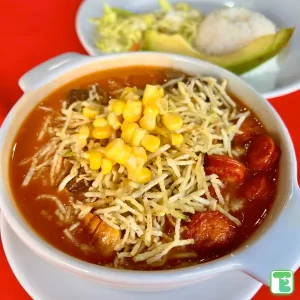
Cazuela de Frijoles
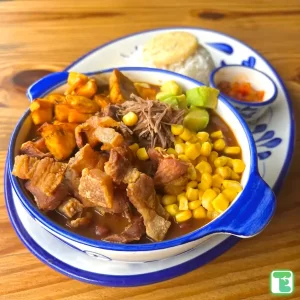
Cazuela Paisa, which is the same as Cazuela de Frijoles.
c. Cazuela de Bagre
Cazuela de Bagre is a bit similar to Cazuela de Mariscos, but is a typical dish from the Pacific region, while Cazuela de Mariscos is a typical dish from the Caribbean region.
This creamy casserole from the Pacific is made with catfish, whereas the casserole from the Caribbean is made with a variety of seafood.
Bagre, or catfish, is a common ingredient in this region which can lead to interesting dishes such as this Cazuela but also dishes like Pastel de Bagre y Papa, which is a Colombian fish pie.
Once again, it’s the perfect example of how diverse Colombian gastronomy is, which makes food lovers like you and me only hard to choose from.
5. Patacones
Similar to arepas, patacones can be served as an individual dish or as part of the meal.
Patacones are deep-fried green bananas (platano verde) and these crunchy crisps can bring dishes to the next level.
For example, when you try typical coastal food, you usually eat seafood with coconut rice, which is pretty light. Now, add these hearty, crispy banana “cookies” to it, and your meal has more texture and is more filling.
As you might have guessed by now, there are slightly different versions to be found in Colombian gastronomy, even though patacones are not from a specific region itself (it’s eaten everywhere in Colombia).
In the coastal area, the patacones are usually eaten during breakfast and are served with cream (Suero), which can be ordered as an individual or side dish.
In other parts of the country, you can find patacones with all sorts of toppings, similar to arepas that are eaten during lunch or dinner.
You can find these delicious creations usually at places that are specialized in arepas (and patacones).
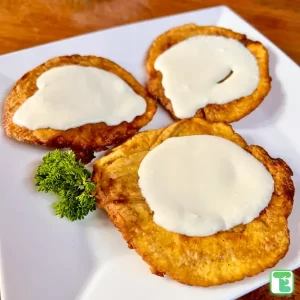
Patacones with Suero
6. Bandeja Paisa
Although we categorized Colombian food into four categories, there are obviously other types of food to be found.
Bandeja Paisa is such a type of food and it’s one of the most popular Colombian dishes.
So, when visiting Medellin and other parts of Antioquia, one must try this famous dish.
Translated it means “Plate from Paisa“, the northwest region of Colombia that includes Medellin.
Like in other gastronomies, typical food often comes from a period where either the people did not have much to eat and had to be creative or when people had to eat heavily as they had to work all day in the fields and needed that energy to keep up.
For Bandeja Paisa, the latter applies here.
It’s a typical dish that was eaten by men who needed to work all day and rest assured, this Paisa plate contains enough calories to keep going for days.
When summing up the ingredients that are on the plate, you might start thinking that you want to kill someone: Chorizo, Morcilla (blood sausage), Chicharron (pork belly), Carne Molida (ground beef), red beans, white rice, fried egg, avocado and patacones.
It’s like an English Breakfast but with more greasiness.
Let’s be clear, it is crazy delicious and stuffing yourself with all the goodness is something you should treat yourself to every now and then.
This hangover-killer can be found at many local Colombian restaurants, but for the absolute best, check out our article about the best Bandeja Paisa in Medellin.
Note: there are several different variations to be found in Colombian gastronomy, which just contain more or less of the ingredients. The principle stays the same: it’s a calorie bomb!
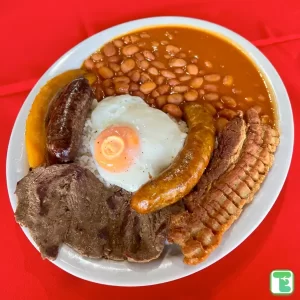
Bandeja Paisa but with extra beef.
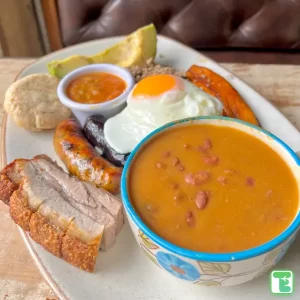
Typical Bandeja Paisa.
7. Tamales
Tamal is the oldest Colombian dish we recommend you try.
Tamales originated in Mesoamerica as early as 8000 to 5000 B.C. and nowadays, almost every South American country has its own version of Tamal.
Inside the wrapped banana leaves you can find a dough, which is made of masa, accompanied by meat and vegetables.
A tamal is steamed, meaning that the meat is incredibly soft and tender.
You can find a variety of different versions throughout the country, but arguably the most famous Tamales can be found in Bogota.
The so-called Bogotano Tamales are made with longaniza (pork sausage) and chickpeas.
In Bogota, one of the most popular places to eat Tamal is also the oldest restaurant in the city: La Puerta Falsa.
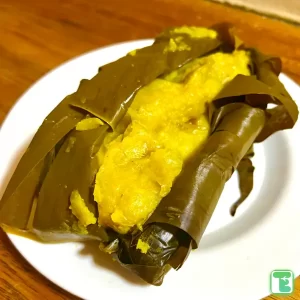
One of the oldest Colombian dishes: Tamales.
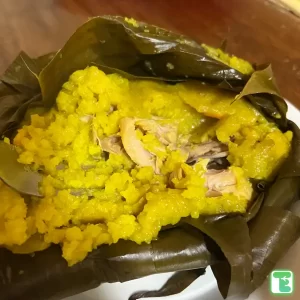
Inside the Tamale, you can find succulent meat and vegetables.
8. Calentado Paisa
Similar to many other cuisines, for example, Fried Rice in the Asian cuisine, this type of food is made with leftovers.
And as comforting Fried Rice can be, as comforting Calentado Paisa is.
Bits of chicharron, fried banana and beans are combined with rice and transformed into a tasty, savoury lunch.
While most “paisa” meals (dishes in the Antioquia region) are heavy, this plate of fried rice is light and ideal to eat during the day.
The Calentado Paisa is served with arepas, a sunny-side-up egg and a slice of avocado.
It’s the perfect example that comfort food does not always have to be heavy.
A must-try when you’re in the Antioquia region (e.g. Medellin).
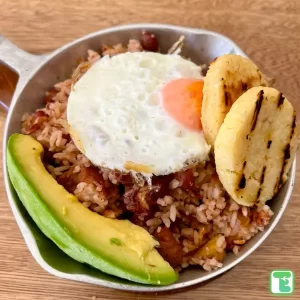
Calentado Paisa
9. Sausages and Meat
When you travel through this stunning country, you will notice the abundance of cattle on these bright green grass fields.
It is no shock that meat plays a vital role in Colombian gastronomy.
To make it a bit clearer, we categorized typical Colombian meats that can be ordered as an individual dish or are part of larger platters and meals.
a. Morcilla
Morcilla is blood sausage.
There is no other way to say it.
While it might disgust some readers, I honestly admit: I love the flavour of Morcilla, even though I’m not a big fan of eating foods with these adventurous ingredients.
It’s a common ingredient for dishes such as Bandeja Paisa and Picada (which we describe further in this article).
But you can order Morcilla as an individual dish as well.
The sausage is often only grilled, but my personal favourite version of Morcilla is when the sausage is sliced in pieces first, and then fried on both sides.
Talk about your ultimate umami flavour!
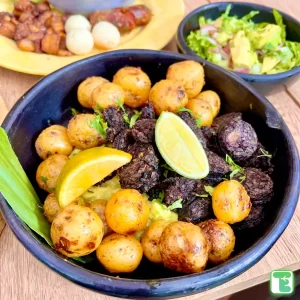
Morcilla, fried on both sides.
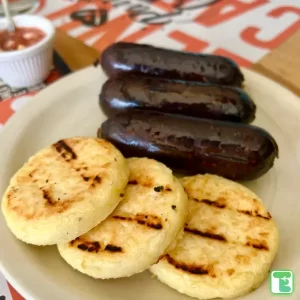
Grilled Morcilla with arepas.
b. Chorizo
Contrary to Spanish Chorizo, Colombian Chorizo is not spicy at all but does contain loads of flavours you can expect from a Chorizo.
Aside from ordering these tasty sausages at restaurants, you can find plenty of street food vendors in cities that specialise in this salty, savoury sausage.
Chorizo is a common ingredient of meat platters such as Pandeja Paisa or as a main ingredient of Arroz Con Chorizo.
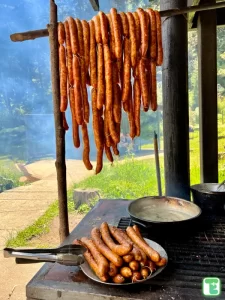
Fresh Chorizo straight from the barbecue
c. Salchichon & Salchicha
Two common sausages in Colombian gastronomy are the Salchichon, which is a dried, smoked pork sausage and the Salchicha, which is a sausage that has similarities to a hot dog.
Both sausages are used as an ingredient for a dish, not as a stand-alone meal.
For example, you can use these sausages to add to your Sopa de Lentejes.
d. Chicharron
Ah, Chicharron.
One of my favourite meats in Colombia.
Chicharron is a deep-fried pork belly.
Crispy on the outside, and tender on the inside, these tremendously popular ingredients can be found in so many Colombian dishes.
From Bandeje Paisa to Cazuela de Frijoles, these bits of savoriness add so much flavour and texture to Colombian dishes.
But Chicharron is not the healthiest type of meat, so it’s not something you eat on a daily basis.
Have a look at our article about the best Chicharron in Medellin to give you an idea of how Chicharron is used in Colombian cuisine.
Although in general, it’s a Peruvian dish, there is a Colombian version of ceviche that you must try if you have the chance and that is Ceviche de Chicharron.
Don’t be scared as, contrary to normal ceviche, the pork is not served “raw”.
The chicharron is bathed in cilantro, lime and other deep herbs.
Together with the crispy pork belly, it’s one true taste explosion in your mouth.
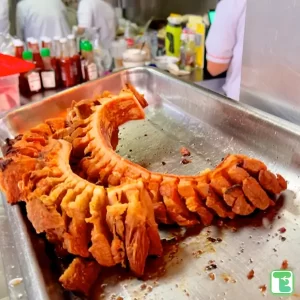
Chicharron, so tasty!
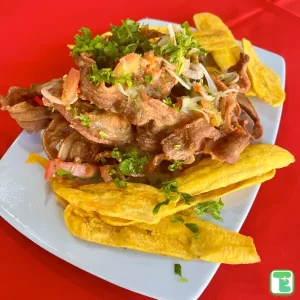
Ceviche de Chicharron.
Although it has nothing to do with Chicharron, it’s worth mentioning that another type of ceviche, Ceviche de Camarones, is worth trying too.
This typical coastal food is made with cooked prawns that are covered in a creamy sauce along with tomato (salsa), which gives it a good mixture of sweet and sour flavours.
Typically, the ceviche is served with crackers.
This is far from the ceviche I’m used to, but the Colombian way of making ceviche is pretty tasty and refreshing.
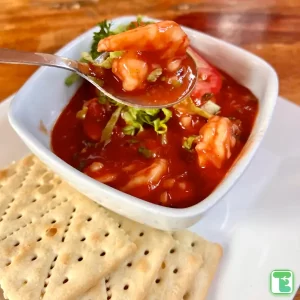
Ceviche de Cameron with Crackers
e. Picada & Fritanga
One of the coolest dishes in Colombian cuisine is Picada, which is a plate full of grilled meats accompanied by potatoes and other carbs.
What I like about Picada is that you eat it together with friends, most of the time with an ice-cold beer on the side.
Not only is it a delicious meal (I mean, who doesn’t love barbecued meat), but it’s a social meal as well as you eat, laugh and drink together.
You can find Picadas for one or two people, but personally, I love to eat picadas with plenty of friends.
Fritanga is similar to Picada, but the difference is that the plate of Fritanga contains deep-fried food, while Picada is a plate full of barbecued meats. Both are social meals.
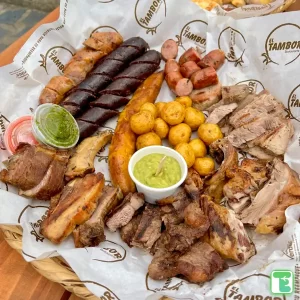
Picada, the ultimate share-with-friends food.
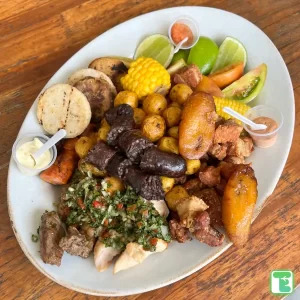
Picadas can have different ingredients.
f. Carne a la Llanera
Carne a la Llanera is the ultimate Colombian dish for meat lovers.
Over a wood fire, meat is grilled until it reaches the ultimate tenderness.
The combination of succulent, good-quality beef with the smokiness of the wood fire is what makes it so incredibly tasty.
This specific way of barbecuing the meat comes from Los Llanos, which is east of the Andes and includes parts of Venezuela as well.
This area is full of cattle and you can imagine how they perfected their barbecue skills with so much beef in this area.
It is possible to find Carne a la Llanera restaurants in cities like Bogota and Medellin as well.
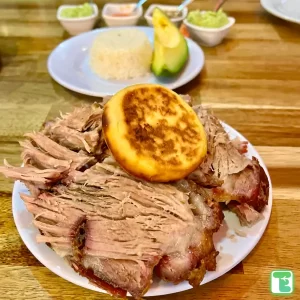
Carne a la Llanera
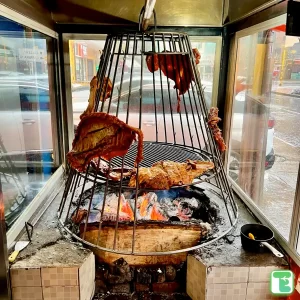
The typical way of grilling the meat until perfection.
g. Lechona
Lechona is the king when it comes to Colombian meat.
Lechona, which is a whole roasted suckling pig, is usually eaten on special occasions, although you can find restaurants that specialise in Lechona in the larger cities.
The Colombian version of this popular Spanish dish originates from Tolima, in the central region of the country.
For many foreigners, Lechona is on their bucket list and therefore the ideal candidate for your quest for what to eat in Colombia.



Lechona
10. Pescado Frito
Although surrounded by two oceans, seafood is not eaten that often in the country, except for the coastal regions.
So when you are travelling in this area, which most tourists do, eating typical Colombian seafood is basically a must.
We cannot come up with something better than Pescado Frito, which is a deep-fried fish served with coconut rice and patacones.
The fish is nicely carved in a specific way that you can easily eat the fish with your bare hands, the Colombian way.
Don’t even try to eat it with a knife and fork as people will stare at you.
Pescado Frito is one of the lighter meals the Colombian cuisine offers, although the patacones can be filling.
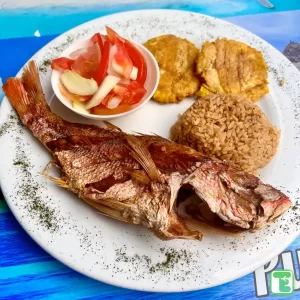
Pescado Frito (Fried Fish with Coconut Rice and Patacones).
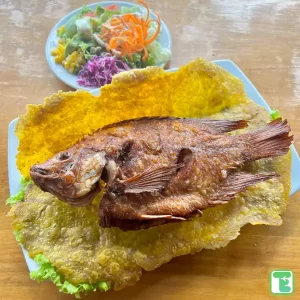
11. Arroz Con Chorizo & Arroz Con Pollo
Arroz con Pollo is simply translated as rice and chicken.
This traditional dish can be found in many South American countries, with each country with its own variant.
Although some claim it’s similar to Paella, there are some big differences, including the lack of saffron and the type of rice.
But Arroz con Pollo is an incredibly satisfying dish.
A bowl contains lean chicken and a combination of herbs and vegetables.
The rice is cooked in chicken stock, which gives it a nice flavour. To finish all this, you top the rice off with some tomato salsa.
There is also another popular variant, which is Arroz con Chorizo, which is much heartier and saltier, but nonetheless tasty.
This classic Colombian dish can be found everywhere in the country and it’s actually a common dish to make at home.
12. Salchipapa
Although I might have given you the impression that Colombians only eat arepas with their dishes, potatoes are an important part of the daily diet too.
You can find some really good types of potatoes in this country thanks to the biodiversity of the country.
And when there are good potatoes to be found, good fries can be made.
Salchipapa is the best of both: delicious fries topped with Salchicha sausage and plenty of sauces, including barbecue sauce.
This type of fast food is a warm welcome after a night out in places like Medellin, Bogota or Cartagena.
Typically, Salchipapa is made with Salchicha sausage, however, there are countless versions to be found throughout the country.
Places like Chip Station offer fries with all sorts of toppings, such as Mexican toppings (pulled pork, guacamole, pico de gallo) and Colombian toppings (chicharron, frijoles, guacamole and pico de gallo).
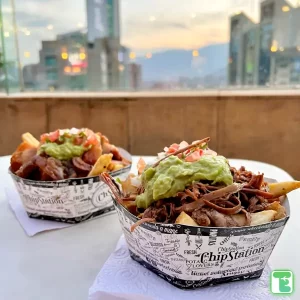
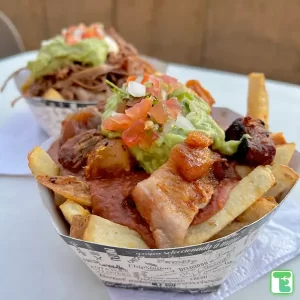
Salchipapa with pulled pork and crispy chicharron.
13. Deep-Fried Treats:
At the start of this article, we mentioned how important Empanadas are to Colombian cuisine.
There are many other variants of deep-fried dough to be found.
Most of the time, street food vendors and shops that sell Empanadas also offer other deep-fried treats.
Some of the most popular ones are listed below.
a. Buñuelo
Typically a treat that you eat during Christmas in Colombia, you can find plenty of shops that sell these perfectly round balls all year long.
A Buñuelo is a fried dough fritter that’s popular in many South American countries.
The Colombian version is made with cheese.
Crispy on the outside, nicely soft and almost spongy on the inside, these deep-fried balls are super tasty and savoury thanks to the use of typical Colombian cheese called Queso Costeño (which also tastes amazing on Patacones).
During the Christmas period, which starts on the 7th of December, it’s common to combine Buñuelo with Natilla, a typical Colombian dessert that we describe later in this article.
b. Pasteles de Pollo
Most empanada shops also serve Pasteles de Pollo, which is a Colombian deep-fried chicken pie.
Made with the same type of “dough” as the Empanadas, which is from potatoes, these pies are richly filled with shredded chicken.
Usually the size of a tennis ball, these deep-fried pies can be pretty filling.
The filling is much more neutral compared to Empanadas as not many herbs are being used to spice up the chicken.
But with the help of Aji (spicy and sour dip) and guacamole, Pasteles de Polo can taste even better.
As always, there are different versions to be found.
For example, in Medellin, you can find a typical “Paisa” filling.
Paisa is the name of a specific region and the name of people from Medellin.
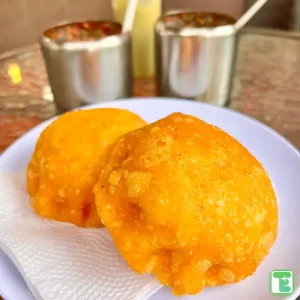
Pasteles de Pollo
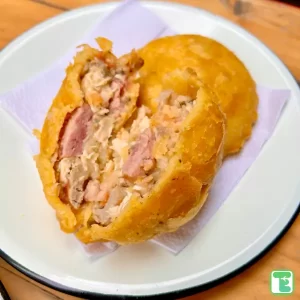
Pasteles de Paisa
14. Desserts & Sweets
a. Arroz Con Leche
As mentioned earlier in this article, Colombia has an abundance of cattle.
That automatically means there is plenty of milk.
A good example of how Colombians use milk is the production of so many good cheeses.
But milk is also used in desserts, for example with Arequipe and this Arroz Con Leche.
Arroz Con Leche is a Colombian rice pudding, which is super refreshing.
Some restaurants offer this as a dessert, but usually, you buy it from a specialist shop. These packs of rice pudding are cheap and you can easily place them in your fridge for days.

Arroz Con Leche, Colombian Rice Pudding
b. Arequipa
Arequipa, or dulce de leche, is caramelized milk and a popular treat in Colombia.
You can find this dessert in every supermarket.
Although you should not eat the whole pack at once as it’s so heavy and sweet, many of us cannot resist the temptation of not finishing it in one sitting.
There are restaurants that make desserts with Arequipe and there are shops that make candy and cakes with Arequipe.
Flavour-wise, it’s a bit similar to Werther’s Original, a popular caramel candy from Germany.
When visiting Colombia, make sure not to miss this treat. It’s also a great product to bring back home and give to your friends and family as a delicious souvenir.
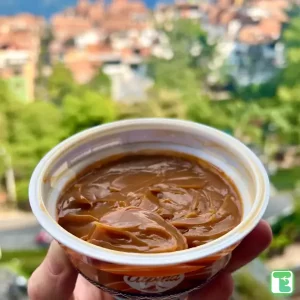
Arequipa, Colombian food for the sweet tooths.
Overview of typical Colombian food per region
In the last section of this article, we give an overview of typical Colombian food that you only find in certain regions or the specialties per region.
With this overview, you can easily explore the local cuisine per region when traveling through this amazing country.
a. Caribbean region
| Name of Colombian Food |
Extra information |
|---|---|
| 1. Coconut Rice |
Typically served with Caribbean dishes. |
| 2. Arepa Huevo |
Deep-fried arepa with an egg inside. |
| 3. Bollos |
A bit similar to arepa, typical from the Caribbean. |
| 4. Cazuela des Mariscos |
Colombian seafood stew with or without cheese gratin. |
| 5. Pescado Frito |
Fried fish with patacones & coconut rice. |
| 6. Mote de Queso |
Typical Caribbean soup with cheese |
| 7. Patacones with Suero |
Patacones with cream. |
b. Pacific region
| Name of Colombian Food |
Extra information |
|---|---|
| 1. Bocachico en Zumo de Coco |
Typical Pacific fish in coconut juice. |
| 2. Arroz Atollado |
Atollado rice with beef, chicken, pork and chorizo. |
| 3. Tapao de Pescado |
Typical fish stew from Guapi (Cauca). |
| 4. Cazuela de Bagre |
Catfish casserole, similar to Cazuela de Mariscos. |
| 5. Chautiza |
Tiny fish that’s being used in many Pacific dishes. |
| 6. Sopa de Cangrejo |
Typical crab soup from the Pacific. |
| 7. Chancacas |
Typical sweet with coconut, panella in lemon leaves. |
There you have it, our answer to what to eat in Colombia.
